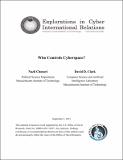| dc.description.abstract | When Wikileaks released hundreds of thousands of Iraq War logs and diplomatic cables in 2010, a horrified US government sprang into action—but the classified information the government hoped to keep from public view quickly migrated to overseas servers, ensuring that it would likely never be suppressed.
After an anti-Islamic movie trailer was posted on YouTube in 2012, the horrified Pakistani government rushed to block its nation’s access to the Internet video service—and, in the process, temporarily disrupted YouTube access around the world. Toward the beginning of the Egyptian revolution, the government of Hosni Mubarak tried to quell the cyber-based aspect of the protest by turning off the Internet, but that effort did little to alter the course of the revolt. China, however, continued to block searches for the terms “Egypt” and “Arab Spring,” with at least some success.
Until recently, cyberspace was considered largely a matter of low politics, the term political scientists use to denote background conditions and routine decisions and processes. Over the last decade, though, cyberspace, with the Internet at its core, has clearly begun to shape the domain of high politics—that is, the national security considerations, core institutions, and decision systems that are critical to national governments. Those governments have long held a monopoly on high politics and are, in turn, trying to control the future of cyberspace, with, at best, very limited success.
The field of international relations, rooted in 20th-century issues and theories, has not kept pace with the emerging significance of cyberspace; and as the empowered non-state groups and individuals of cyberspace and international politics now simultaneously shape one another, the potential collisions of law, policy, and practice have barely been identified. Before the international community can begin to minimize the negative consequences of those inevitable collisions, it needs to understand how and where cyberspace and international relations intersect and influence one another, and who controls those intersections. | en_US |
